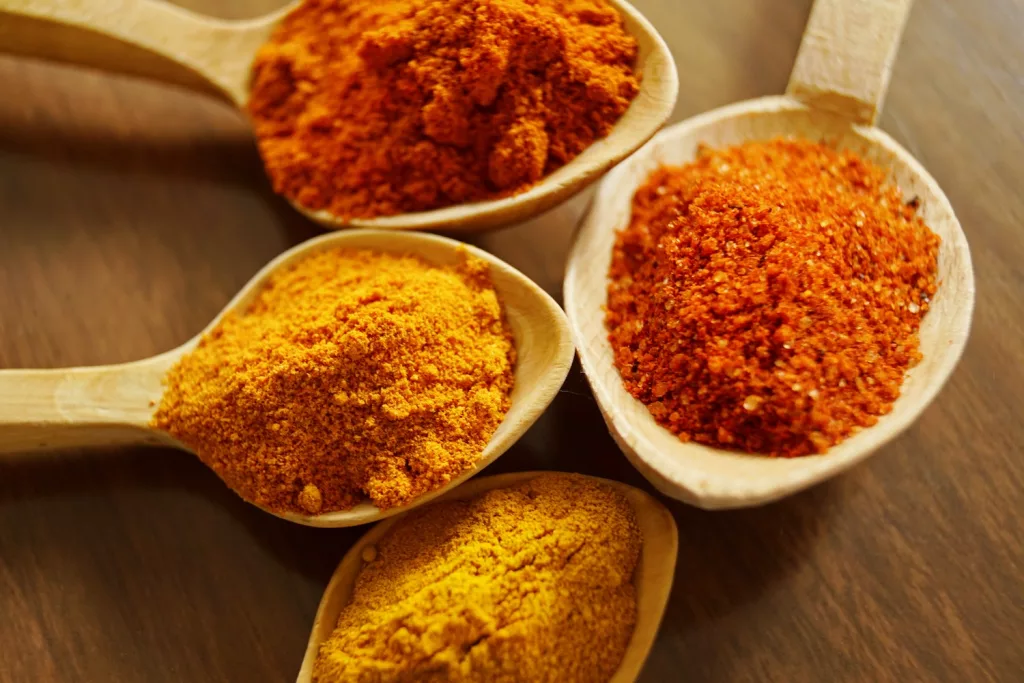Do you know what Turmeric is? Have you ever stumbled upon the health benefits of Turmeric? Even if you don’t have a spice handy, chances are you’ve heard of it.
A deep golden orange spice, turmeric is used in cooking and baking for its colour, flavour and nutritional benefits. Turmeric, a relative of ginger, is a spice derived from the rhizome (root) of a plant native to Asia. It has also been used in the practice of Ayurveda and other forms of traditional Chinese and Indian medicine.
The health benefits of curcumin are the real gold of turmeric. Turmeric gets its characteristic yellow colour from curcumin. It’s what gives turmeric its therapeutic properties. As well as being a powerful antioxidant, curcumin also has powerful anti-inflammatory effects.
The spice has potential health benefits and can be easily added to foods such as smoothies and curries. If you’re interested in learning more about the health benefits of turmeric, read on!
9 Most Notable Health Benefits of Turmeric Are Listed Below.
1. Turmeric boosts antioxidant activity.
Oxidative damage is thought to be one of the causes of ageing and many diseases. Free radicals, or molecules with unpaired electrons, play a role in this process. In the body, free radicals often react with vital organic compounds such as fatty acids, proteins or DNA.
The primary benefit of antioxidants is the defence they provide against free radicals. Curcumin’s ability to neutralise free radicals is due to its chemical composition, making it a powerful antioxidant. It does this by inhibiting the activity of free radicals and enhancing the effectiveness of other antioxidants.
2. Curcumin naturally reduces inflammation.

The inflammatory response is critical. It plays a role in repairing damage to your body and protecting you from invading pathogens. While your body’s natural response to injury or infection – acute inflammation – is beneficial, chronic inflammation that attacks your own tissues is a cause for concern.
Curcumin has the ability to inhibit a number of inflammatory molecules. However, to be effective as a medicine, extremely high doses are required.
3. Turmeric may reduce the risk of cancer.
Unregulated cell growth is a hallmark of the disease known as cancer. Curcumin supplements have shown promise in treating a wide range of cancers. Curcumin is a herb that has been studied and found to affect cancer growth and development, suggesting that it may be useful in cancer treatment.
What research has shown is that it can
help kill cancer cells
slow the process of angiogenesis (the growth of tumour blood vessels)
slow down metastasis (the spread of cancer).
4. Curcumin may boost brain performance
Before scientists learned more about neurons, it was thought that they stopped dividing and multiplying after early childhood. They have since learned that this is not the case. New connections can be made between neurons, and in some regions of the brain the number of neurons can actually increase through proliferation.
Brain-derived neurotrophic factor (BDNF) drives this process. This is a gene that directs the production of a protein that prolongs the life of nerve cells. The regions of the brain that regulate food intake, fluid balance and overall weight all contain high levels of brain-derived neurotrophic factor (BDNF), a protein that is important for learning and memory.
Reduced levels of BDNF protein have been linked to many common brain disorders, including depression and Alzheimer’s disease. Curcumin has been shown in animal studies to potentially increase BDNF levels in the brain. Many brain diseases and the natural decline that comes with age could be delayed or even reversed if this could be achieved.
5. Curcumin shows promise as a potential treatment for Alzheimer’s disease
Alzheimer’s disease is the most common form of dementia and may be responsible for up to 70 per cent of all dementia cases. Some of the symptoms of Alzheimer’s disease can be managed with treatment, but there is currently no cure. That’s why it’s important to take precautions to avoid the problem in the first place.
Curcumin has been shown to cross the blood-brain barrier, which could be good news. Curcumin helps reduce inflammation and protects cells from oxidative damage, two factors thought to contribute to Alzheimer’s disease.
6. Curcumin may reduce the risk of cardiovascular disease.
Cardiovascular disease ranks as the number one cause of death worldwide. Many decades of research have produced a wealth of information about its incidence and causes. Heart disease is a complex problem with many potential causes.
It’s possible that curcumin may be able to stop the progression of heart disease in its tracks. The endothelium is the lining of your blood vessels and improving its function is one of the main benefits of curcumin when it comes to cardiovascular disease.
Heart disease is significantly influenced by endothelial dysfunction. This condition occurs when the endothelium fails to control key physiological processes such as blood pressure and clotting.
7. Curcumin may slow ageing and prevent age-related diseases.
Curcumin may promote longevity if it is effective in warding off degenerative diseases such as heart disease, cancer and Alzheimer’s. Such indications point to curcumin’s potential efficacy as an anti-aging supplement. Curcumin’s potential benefits extend far beyond disease prevention, as oxidation and inflammation are thought to contribute to the ageing process.
8. Curcumin may help with depression
Curcumin may be useful in treating depression. Reduced levels of BDNF and a smaller hippocampus, an area of the brain involved in learning and memory, have been associated with depression.
Some of these changes may be reversible due to curcumin’s ability to increase BDNF levels. Curcumin has also been shown to increase levels of the feel-good neurotransmitters serotonin and dopamine in the brain.
9. Curcumin supplements may help people with arthritis.
Arthritis is a widespread problem in the western world. Inflammation of the joints is a common symptom of the various forms of arthritis. Curcumin’s anti-inflammatory properties suggest that it may be useful in the treatment of arthritis. One study found that curcumin was more effective than an anti-inflammatory drug in treating rheumatoid arthritis.
Curcumin, the active ingredient in turmeric, has been shown in scientific studies to have a wide range of health benefits, including those related to cardiovascular health, cognitive function and cancer prevention.
You can add turmeric to dishes such as curries, soups and smoothies, or take a turmeric supplement. Always check with your doctor before taking any type of supplement, including turmeric.
Do what you can to improve your health, and don’t be afraid to discuss alternative or complementary therapies with your doctor. Together you can make informed decisions that everyone can agree on.
Disclaimer: This is for informational purposes only.
Did you find this helpful? Let us know in the comments.
Source: Healthline
You can also visit our Facebook and YouTube pages to know more about plants and their health benefits.
You might also like:








